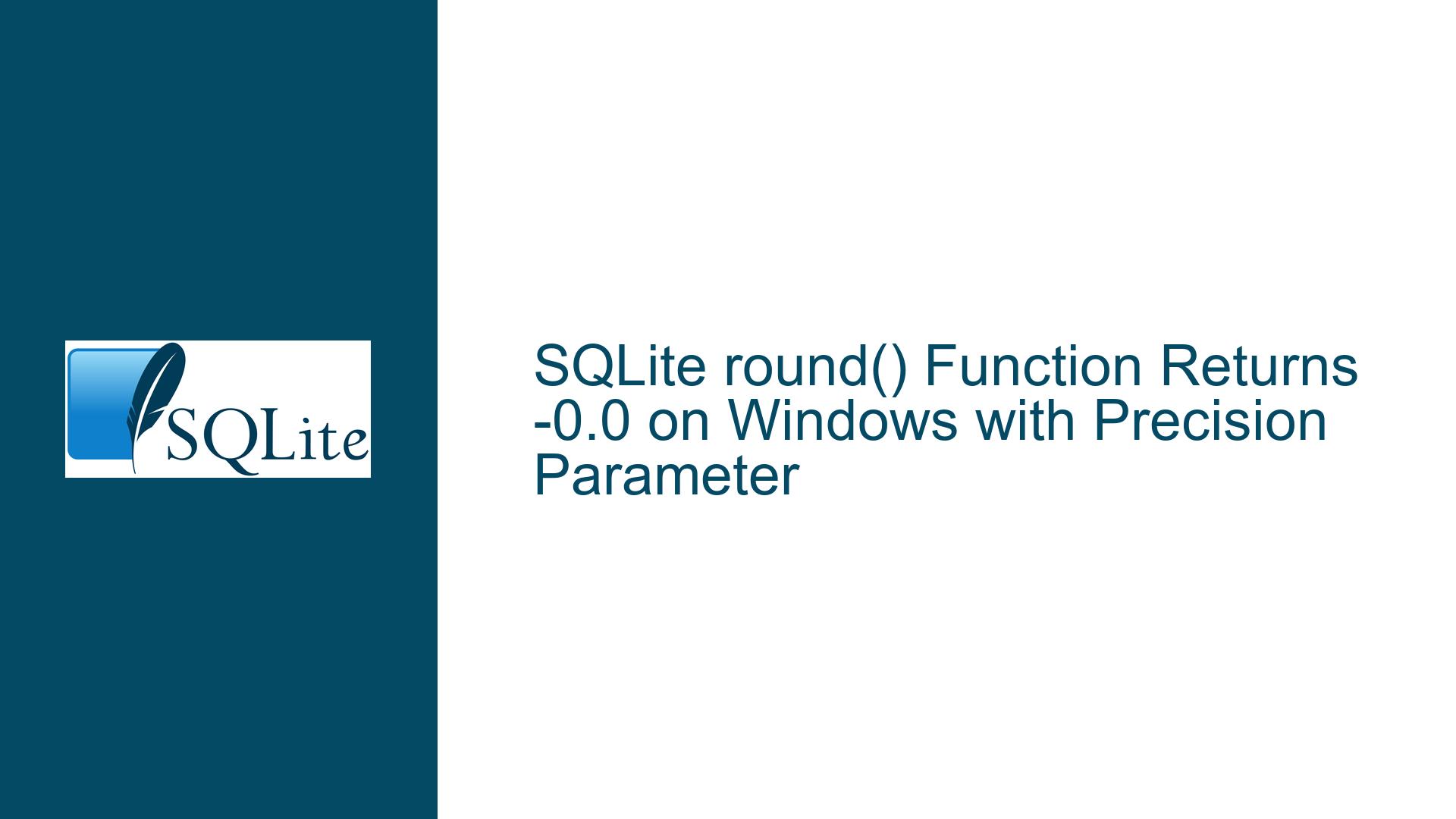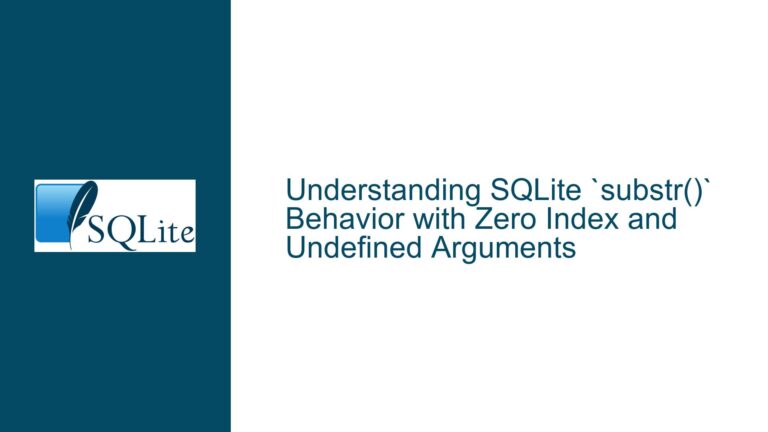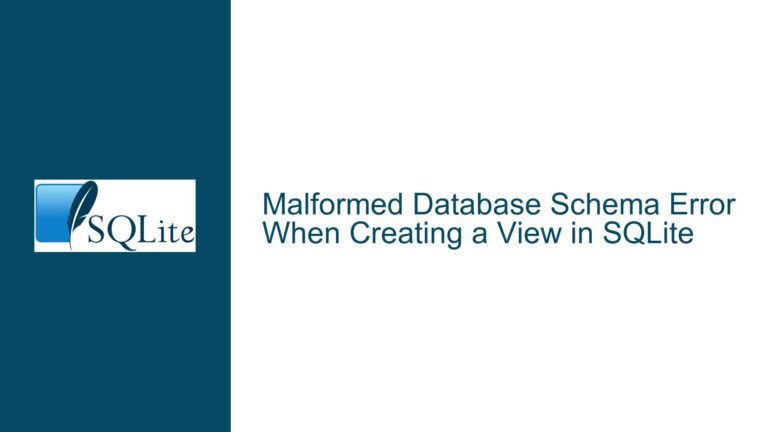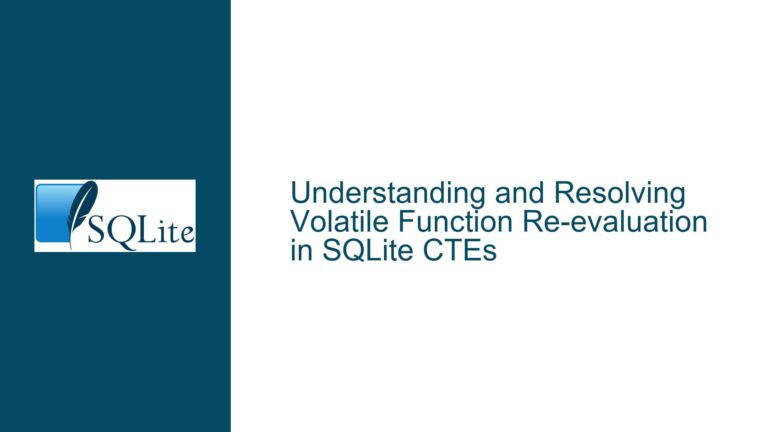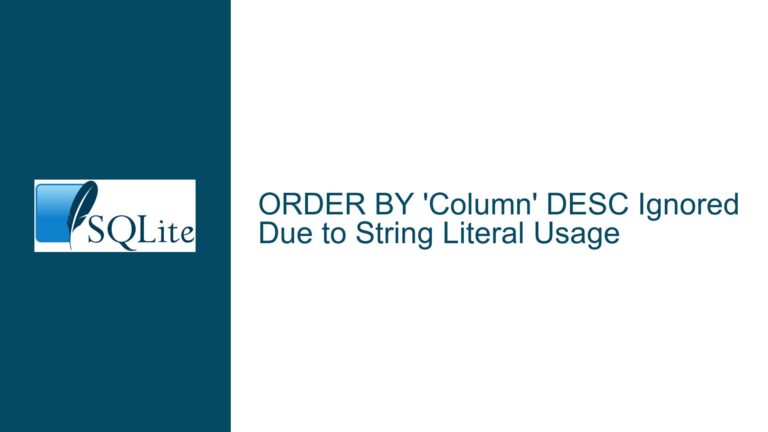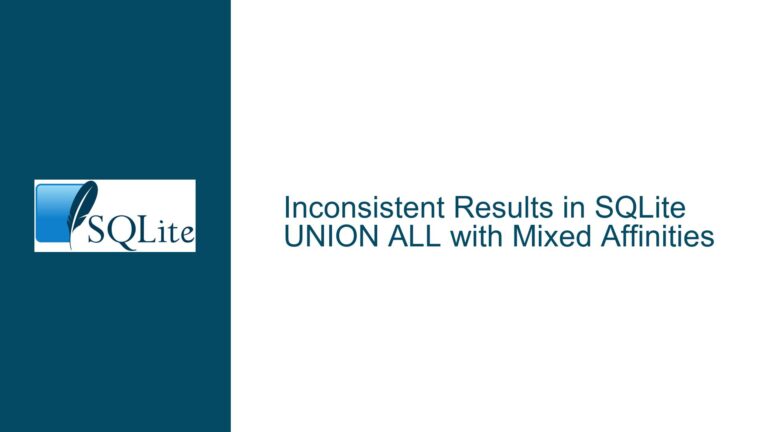SQLite round() Function Returns -0.0 on Windows with Precision Parameter
Unexpected Sign in Rounded Zero Values: -0.0 vs. 0.0
Issue Overview
The round() function in SQLite may return -0.0 instead of 0.0 when rounding a zero-valued floating-point number with a precision parameter (e.g., round(0.0, 1)). This behavior is platform- and build-specific, observed in some SQLite 3.36.0 installations on Windows systems. The anomaly occurs exclusively when the second argument (precision) is specified. Without the precision parameter, round(0.0) returns 0.0 as expected. The discrepancy arises from how floating-point arithmetic is handled under specific compiler configurations, particularly when SQLite is compiled with flags that alter the treatment of floating-point operations. While -0.0 and 0.0 are numerically equivalent in SQLite (and IEEE 754 floating-point standards), the presence of a negative sign in the result can disrupt applications expecting strictly non-negative zero representations or formatting logic that treats -0.0 as distinct from 0.0.
Root Causes of the -0.0 Result
Three primary factors contribute to this behavior:
Floating-Point Representation and Compiler Behavior
SQLite relies on the host system’s C library for floating-point operations. Theround()function’s implementation delegates to the C standard library’sround()function when a precision argument is provided. On Windows, builds using Microsoft Visual C++ (MSVC) may propagate the sign bit during certain floating-point operations due to compiler optimizations or differences in the math library implementation. For example, rounding a value like-0.0001to one decimal place could theoretically yield-0.0if the intermediate calculation retains the sign bit. However, when the input is explicitly0.0, this suggests a deeper interaction between SQLite’s type handling and the compiler’s floating-point environment.Build Configuration Flags
SQLite’s compile-time options heavily influence its floating-point behavior. Flags such as-DSQLITE_OMIT_FLOATING_POINT(which disables floating-point support entirely) or custom math library overrides can alter howround()processes values. In the original discussion, the user resolved the issue by adjusting build flags, indicating that the problem stemmed from a non-standard configuration that affected the floating-point stack or sign preservation during rounding.Parameter Binding and Type Affinity
When values are bound to SQLite parameters or stored in columns with real affinity, subtle type conversions can occur. If a value is bound as a string (e.g.,'-0.0') instead of a double, SQLite’s type conversion rules might preserve the sign during arithmetic operations. This is less likely in the reported case but underscores the importance of ensuring consistent data types in operations involvinground().
Resolving the -0.0 Result: Diagnosis and Solutions
Step 1: Verify SQLite Build Configuration
Begin by confirming the SQLite version and compiler flags used in the build. Execute .version in the sqlite3 CLI to retrieve details:
sqlite> .version
SQLite 3.36.0 2021-06-18 18:36:39 5c9a6c06871cb9... msvc-1926
If the build uses msvc (Microsoft Visual C++), inspect whether custom flags like SQLITE_OMIT_FLOATING_POINT were enabled during compilation. Rebuild SQLite without such flags if they are present.
Step 2: Test Rounding Behavior Across Environments
Run the following query to isolate the issue:
SELECT
round(0.0) AS no_precision,
round(0.0, 1) AS with_precision,
round(-0.0) AS neg_no_precision,
round(-0.0, 1) AS neg_with_precision;
If with_precision or neg_with_precision returns -0.0, compare results across different platforms (e.g., Windows vs. Linux) and compiler versions. Consistent 0.0 results on other platforms indicate a Windows/MSVC-specific issue.
Step 3: Inspect Floating-Point Environment Settings
Compiler flags affecting floating-point behavior (e.g., /fp:strict in MSVC) can influence sign preservation. Ensure that the build does not enforce overly aggressive optimizations or non-standard floating-point modes. For example, /fp:fast may relax IEEE 754 compliance, leading to unexpected sign bits.
Step 4: Apply Workarounds in SQL Queries
If recompiling SQLite is impractical, use SQL-level transformations to normalize the result:
SELECT
CASE
WHEN round(value, 1) = 0.0 THEN 0.0
ELSE round(value, 1)
END AS normalized_round
FROM my_table;
Alternatively, add a small epsilon value to eliminate negative zeros:
SELECT round(value + 0.0, 1) FROM my_table;
Step 5: Modify Data Handling in Applications
When retrieving rounded values via an application, explicitly convert -0.0 to 0.0 using language-specific functions. For example, in Python:
rounded_value = max(sql_result, 0.0) # Eliminates -0.0
Step 6: Validate Input Data Types
Ensure that values passed to round() are stored or bound as doubles (not strings or integers). Use CAST if necessary:
SELECT round(CAST(my_column AS REAL), 1) FROM my_table;
Step 7: Monitor SQLite Updates and Patches
Track SQLite’s changelog for fixes related to floating-point operations. While the core issue here is environment-specific, upstream improvements to type handling or compiler flag recommendations may mitigate the problem.
By systematically addressing compiler settings, query logic, and application-layer data handling, the -0.0 result can be resolved or neutralized, ensuring consistent zero sign representation across environments.
